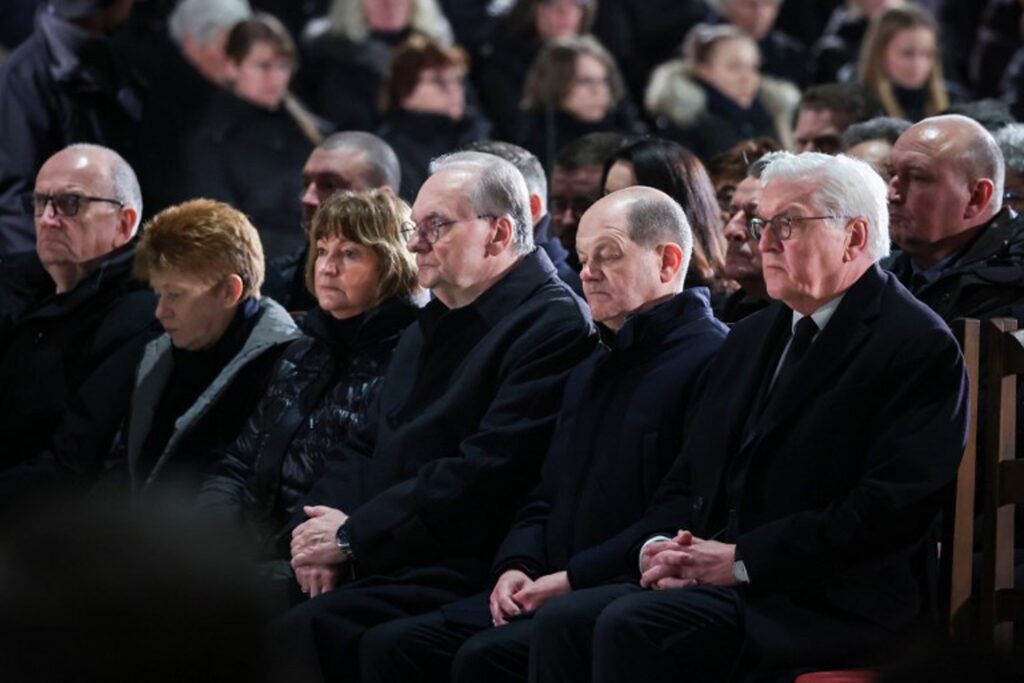The German Government is facing criticism following the deadly car-ramming attack at the Christmas market in Magdeburg on Friday. Many are questioning why warnings were ignored and why the alleged perpetrator was not stopped earlier.
Throughout the weekend, German political leaders visited the scene of the attack in Magdeburg, Eastern Germany, where a 50-year-old man of Saudi origin ploughed through the Christmas market crowds at high speed on Friday evening.
The attack claimed the lives of five people, including a nine-year-old child, and injured over 200. The death toll may rise as at least 40 are in critical condition.
An arrest warrant has been issued for the alleged perpetrator. He has been remanded in custody on charges of five counts of murder and several counts of attempted murder. He was brought before a judge on Saturday evening.
Investigators believe he acted alone. There is currently no indication that another suspect was involved.

Debris and empty stalls are seen on a closed Christmas market one day after a car-ramming attack in Magdeburg, eastern Germany. Credit: Ronny Hartmann / AFP / Belga
Saudi intelligence had warned their German counterparts at the BND (Germany's foreign intelligence service) about the suspected perpetrator Taleb Jawad al-Abdulmohsen a year ago, according to Der Spiegel. They cited a tweet where he threatened Germany with a "price" to pay for its treatment of Saudi refugees.
Despite the warning, no action was taken, and the man increasingly engaged in conspiratorial and hostile rhetoric. He repeatedly accused Germany of failing to protect Saudis fleeing conservative Islamic regimes while welcoming radical Muslims from other countries.
In August, he wrote on his social media account: "Is there a path to justice in Germany without blowing up a German embassy or randomly killing German citizens? I have sought this peaceful path since January 2019, but I have not found it."
In 2013, he was fined in Rostock for "disturbing public order" and "threatening to commit crimes."
Even among the Saudi exile community in Germany, he was feared. "We know him well; he has terrorised us for years," said Mina Ahadi, president of the Central Council of Ex-Muslims.
She described him as a "psychopath adhering to ultra-right conspiracy ideology" who "hates not only Muslims but everyone who doesn't share his hatred."
'No particular danger'
Last year, German police conducted a "risk assessment" on him, concluding he posed "no particular danger," reported Die Welt. A Saudi psychiatrist seemed to be constantly at odds with German authorities and the justice system, however.
A day before the attack, he failed to appear at a court in Berlin. He was being prosecuted for causing a commotion in a police station that wouldn't register one of his complaints, according to German media.
"The incompetence of the administration that allowed the Magdeburg horror is shocking," criticised Alice Weidel, the leader of the far-right Alternative for Germany (AfD), ahead of the upcoming elections.
AfD has called for an extraordinary parliamentary session to address the country's "catastrophic" security situation.
A leftist anti-system party, BSW, echoed similar sentiments. Its leader, Sahra Wagenknecht, demanded the government to explain "why so many warnings were ignored."
Related News
- German Christmas market attack: Five dead and 200 injured, suspect not linked to jihadism
- 'Dissatisfactory' treatment of Saudi refugees possible motive for Magdeburg attack
- Belgian Christmas markets on alert after attack in Germany
Chancellor Olaf Scholz has called for unity among Germans, but the election campaign is in full swing, and the Magdeburg attack has intensified criticism.
"The government knows what it should do, but it is doing nothing," said Peter Havlik, a 65-year-old retired engineer from Magdeburg, during a memorial service for the victims on Saturday evening. He accused the government of failing to "control the borders" to stop migrants.

